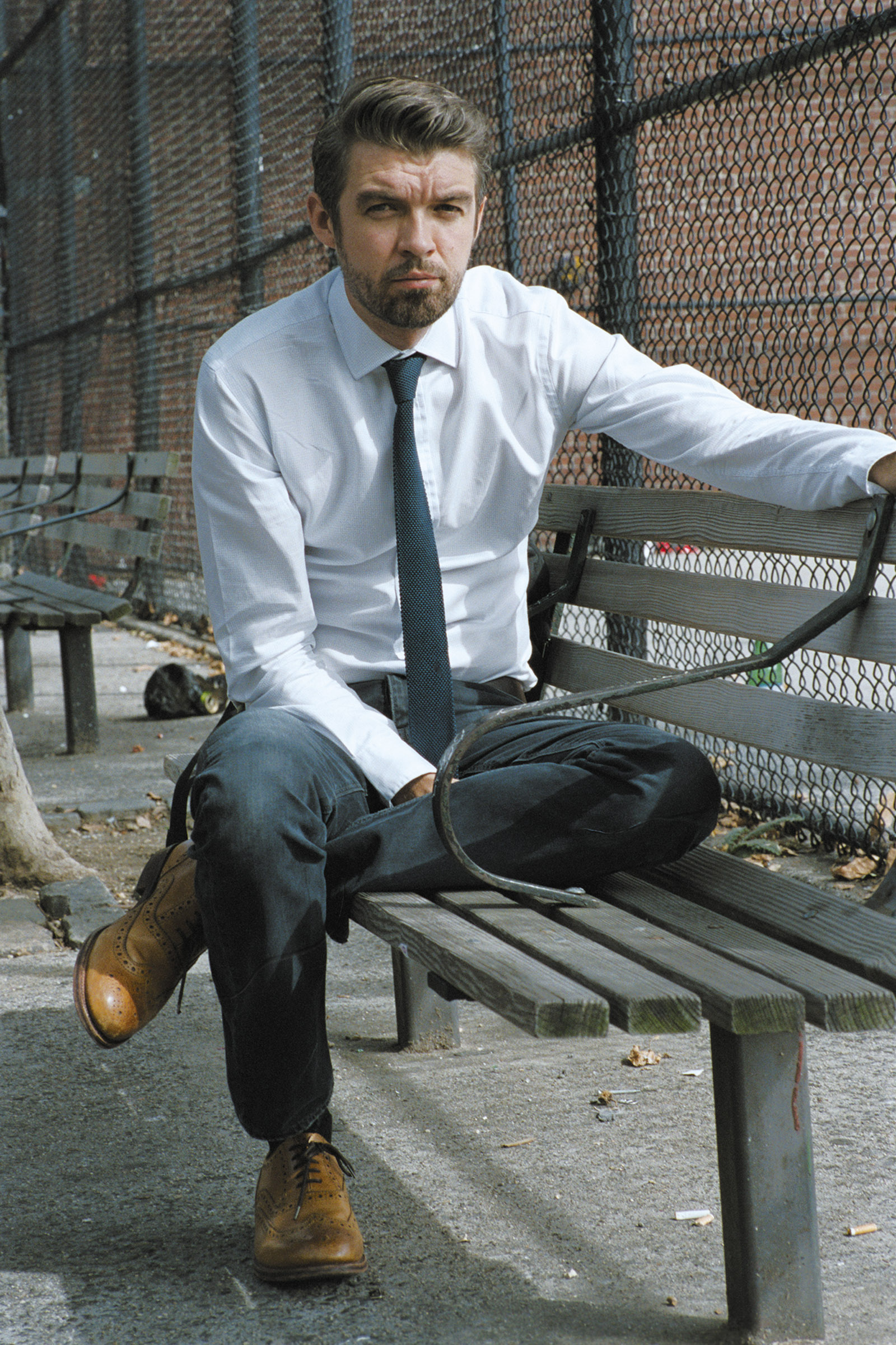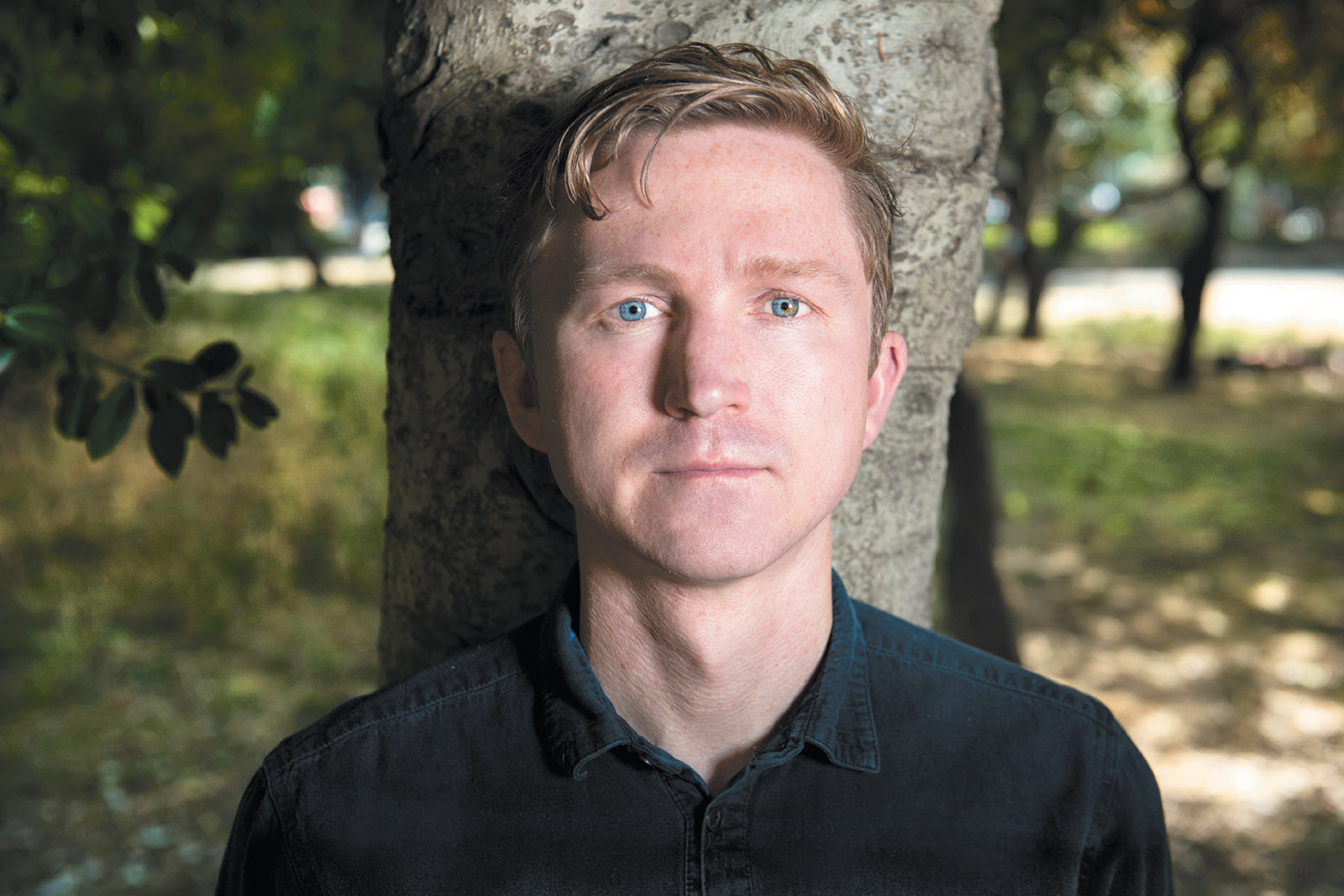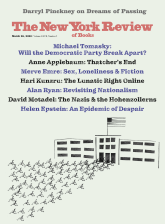When I ask myself what makes poetry from the UK sometimes especially satisfying—a high-performance machine running on all cylinders—the answer has to do with the greater variety and texture of the vocabulary, the economy of its soundscapes, the material pleasure in the language. But it’s more than that. Pleasure in the language, yes, but not just its musicality. Rather, there is a heightened awareness of what Pound called “the dance of the intellect among words” and what Auden called a poem’s “verbal contraption”: rhetorical gambits, angles of attack, the games that metaphors and counterfactuals permit. Perhaps this variety arises from a culture in which verbal exchange signals so much (about region, class, education) that there can be no such thing as plain speaking.
Americans invented business English and confessional poetry; doing business in the UK is an entirely different thing, and confession there is a chump’s game. Reading Nick Laird and Joe Dunthorne, one is always aware that their speakers are arguing, persuading, bargaining, carrot-dangling, sleight-of-handing, and losing gallantly. Laird is from Northern Ireland, Dunthorne from Wales; both have won accolades for their fiction. Laird has written three novels to his four books of poetry; Dunthorne has three novels to his name, and O Positive is his debut poetry collection, though Faber published him in their pamphlet series back in 2010. Far from autofiction, their novels are as varied as their poems, with suspenseful plots and untrustworthy characters and an understanding that drama arises from bad hermeneutics—that is, misreading people.
An instinct for unexpected rhetorical strategies will give social commentary a jolt normally lacking from American poetry, which is nothing if not earnest stuff. It may also be a distancing device, but it is that very distancing that makes it extremely effective, especially if you want to persuade anyone besides the choir to read it. (In American poetry, no one has surpassed Marianne Moore at this—and she died in 1972.) Laird’s “La Méditerranée,” for instance, takes an oblique approach to the crisis of refugee deaths in that body of water. Without once mentioning the headlines, he sketches a cozy restaurant scene with a middle-aged couple, and upon seeing the sea bass on his wife’s plate, the narrator falls through the nets of universal matter—weave of the tablecloth, subatomic spaces—and arrives at the fish eye,
its lightless pupil
sunk flush as a thumb tack holding
the universe itself in place
and I stare at it, and it stares back.
It is no less than an emissary from Nietzsche’s abyss, accusing bourgeois complacency with a reminder of the sea’s apophatic drowned migrants. In the final poem of the book, “Extra Life,” he returns more explicitly to the fantasy of safety mediated through capital and technology:
Watch the boat inflate.
Click twice to make it float.
Click to lift your kids in. Click
to lift your wife. The sea is level
as a puddle until backwash
from the tanker hits and panic
tips you in….
Or take “Grenfell.” On June 14, 2017, seventy-two people died in an inferno that began on a lower floor of a twenty-four-story tower in a council housing complex; it was the largest residential fire in London since World War II, and raised questions about the management, maintenance, funding, and safety of this project set in an otherwise gentrified neighborhood, especially after it was learned that the new, cheap, and controversial cladding on the building was installed in such a way as to create a chimney effect. How to memorialize this ghastly public shambles? More specifically, how to grapple with the technocratic essence of it? There was plenty of blame to go around. Not only the council housing authorities but the fire brigades and then the aftermath of insulting public relations by pusillanimous politicians—an entire slew of failures that can be summed up in one word: systemic.
Laird counters this hot mess with a cool framing device. He offers a customer survey format—now, of course, pro forma after any interaction, from an Amazon purchase to (at least on this side of the pond) an ER visit:
Please rate your experience of
your experience.
Overall, would you say you’re
pleased; mostly
pleased; neutral; displeased; or
not pleased at all?
Would you recommend our
business to a friend?
This blend (bland) of the courteous and the transactional almost manages to smother its outrage:
Please rate your last real day on a
scale of one
to ten where one is utter dullsville
and ten
adjusts the contrast setting
permanently upwards.
How satisfied are you with
customer support?
Please evaluate the final minutes
for how one
might account for it. Any
additional comments
should be left in the space at the
foot of this page
and all of the following pages.
There the poem ends: with the praeteritio of white space where furious accusation should be. Only a cold rage could produce a poem like this: stiff in its constraint of bureaucratese, simmering with the sardonicism of “please rate your last real day.”
Advertisement
Many times over the course of Feel Free, Laird revisits this mode of professional boilerplate, bureaucratese, and computerese. His titles include “Glitch,” “User,” “Autocomplete.” He was a lawyer before he turned to writing and teaching; an encapsulated reflection on legalese and its immunities can be found in his first novel, Utterly Monkey, about a young Northern Irish lawyer in London who must grapple with the contradictions of escaping his roots:
Danny knew he would draft a detailed and lengthy due diligence report that would weigh, in unusually elegant language, any abnormal and arduous clauses in all of Ulster Water’s contracts pertaining to employment, intellectual property, information technology, outsourcing, even the sodding vending machines, and that it would not be read by anyone. It was, he supposed, possible that the conclusion might be perused but it would be so heavily qualified (“In light of the short time available…given the limited resources and lack of information…due to the hostility shown by the target company and the corresponding impossibility of obtaining proper financial documentation etc. etc.”) that any deductions he’d draw would be completely worthless.
Laird, having spent some years in the service of a mode of language that smothers any hint of human emotion or subjectivity, can’t resist toying with it in the medium that’s supposed to be all about human emotion and subjectivity. In the title poem, “Feel Free,” he needles us in the gap, somehow both minuscule and yawning, between automated response and real response:
The thing is
I can be persuaded fairly easily to
initiate immune responses
by the fake safety signals of
national anthems, cleavage,
family
photographs, country lanes,
large-eyed mammals, fireworks,
the King James Bible, Nina
Simone singing “The Twelfth of
Never,”
cave paintings, coffins, dolphins,
dolmens….
All of these things are fair game for poetry, of course, where poetry in its popular mode is simplified to the categories of ode and elegy. Then again:
But I like it also
when the fat impasto of the canvas
gets slashed by a tourist
with a claw hammer, and a
glimpse is caught of what you
couldn’t
say….
Subverting the false order of a hyperautomated society, even by violence, becomes a kind of fantasy—and this from an Irishman who has written about real sectarian violence in his childhood. Writing in these pages about The Life After, a documentary he helped make for the BBC, Laird noted that the film
simply allowed a few of those who had suffered the loss of loved ones in the Troubles—partners or children or siblings—to speak about their experiences…. No one ever recovers from the kinds of losses these people have suffered: a daughter going out dancing and never coming home, a brother abducted in a pub and tortured and murdered and dumped on a hillside, a son stabbed on his way home.
What’s so animating about Laird is that he is able to hold this idea in his head—that survivors of trauma must speak about their experiences—and simultaneously to believe, as he told The Guardian in an interview in 2005, “Poetry is fiction as well. It’s like a psychodrama—a walk through someone else.”
Joe Dunthorne writes very short and is exceedingly light on his feet; he is a trickster of modern parables and surreal counterfactuals. If Laird’s muse is cerebral and linguistic, with poems like “The Vehicle and the Tenor” or “Parenthesis,” Dunthorne’s is all physicality: O Positive is a pun on poetry as ode (the Romantic vocative “O!”) but the slim book is also divided into sections titled “A,” “B,” “AB,” and “O,” as if blood types were halfway to rhyme schemes. He loves soccer, balloonists, hypnotists, swimming pools. “On crutches” is an insult poem in one bravado sentence stretched over eighteen lines, executing a comic reductio ad absurdum:
Are you trying to say
you never leapt from a spinny
chair
into the backing singers’ arms
at the cutthroat barber’s soft
launch
yelling “for I am the centrifuge,
all densities find kin within me” at
which point
they all—ha!—totally caught you,
sang a melancholy chanson
to your charming, harmless mole
then later, as dawn repainted the
playpark,
you shoulder-rolled in dismount
from the tyre’s ecliptic swing
—shoeless,
by now, you maniac—coming
down
weird and hard on your ankle
which shivered
but did not crack—ha!—ha!—
and so
in fact I have no fucking idea
how you hurt yourself—probably
in the shower—
you horrid, impossible man.
I take it the poet is talking to himself here, performing the lyric clown like something out of Apollinaire. In another poem, “Promenade,” he is waylaid by “an immersive theatre troupe” doing improv across the London cityscape, and in “The spins” he addresses his beloved:
Advertisement
This festive season I will murder
myself or you,
either swing from the beams like
the surume/
Bündnerfleisch/culatello of my
native Japan/
Switzerland/Italy or hide beneath
your bed
then hurt you. You kill me by
which I mean
I like your jokes.
If you think this is hyperbole, “I am stupid with” is a poem in which a rose the speaker offers his beloved is a tiki torch “to burn down the village/where everyone who isn’t/the person I love lives.” In light of these lines, I shouldn’t have been as surprised as I was to see Kenneth Koch’s name pop up in “Workshop dream.” Nobody imported daffy French Surrealism into American poetry as lovingly as Koch did, and its general infectiousness among the original cohort of the New York School is much of what has kept their work alive and fresh for several decades now. The sociality of the New York School, too, is on offer here; not only the beloved but “Alex,” “Annette,” “Patricia,” “Richard,” “my big sister”—this is a populated landscape of anecdotes and addresses. “Sestina for my friends” combines Dunthorne’s acrobatics with his formal flair—a sestina juggles the same six end-words over six six-line stanzas, with a recapitulative envoi at the end—while at the same time deprecating himself (to his friends) for his own cleverness and self-consciousness, which they already know about and forgive him for; the poem is both apologia and thank-you bouquet.
Amid all this fun and (sophisticated) games, Dunthorne does give us one dark glimpse behind the magician’s cloak: in “Layers of Toine,” a fictitious Flemish psychoanalyst identifies “five layers of self” and subtly suggests a kind of ars poetica: there’s the surface layer (“the carapace”), then “the mirror,” followed by “the river,” “the cavern,” and lastly:
the final layer which Duijsens elected neither to name nor describe because he felt it would harm us too much to learn that our arrogance and blindness are perfectly balanced…a productive contradiction at the heart of his studies, ruining the trick by learning how it’s done.
I can imagine objections to these bits of cleverness: poetry is not a “trick”—not even one you can’t master. But by assuming argumentative or theatrical arenas for their poems, both Dunthorne and Laird make a bid for attention, specifically attention to the language as it’s spoken by those who have authority over us: lawyers, HR personnel, therapists, tech giants. While novels may do that to some extent, there must be a reason these writers still choose to do poetry. At a time when novels are reduced to “narratives,” a kind of plastic that can be modeled for different media, perhaps poetry is the only space where our language can be put under the microscope.
Even in light of this—the knowledge that the private life is not the only wellspring for poetry, that it has a duty to be public, too—neither Laird nor Dunthorne can cast off the legacy of this “vale of Soul-making” that John Keats left us with. Laird’s final poem in Feel Free is a translation of “Animula Vagula Blandula,” the Roman emperor Hadrian’s deathbed verse addressed to his “little soul”:
and you will soon depart for
lodgings that lack colour
and where no one will know
how to take your jokes.
Dunthorne, speaking in the voice of a Cubist beyond the grave, writes, “I gave each object its soul, a word I rejected, of course.”
He adds, in a footnote, “Along with all the other words, in my usual insouciant way.” Let us enjoy the little jokes of poets while we can; if our souls are unbelieved, they will be gone soon enough.
This Issue
March 26, 2020
The Party Cannot Hold
Escaping Blackness
Left Behind





